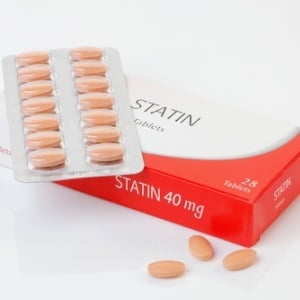
According to a new study, statins, commonly used as a cholesterol lowering drug, can reduce the risk of dying from cancer in post-menopausal women by up to 50%.
Results of the study, which is under review and hence not published yet, made global headlines recently after findings were presented by study leader Ange Wang from Stanford University Medical School at the American Society of Clinical Oncology (ASCO) annual conference in Chicago.
The study forms part of a large clinical trial study that forms part of “The Women’s Health Initiative”, run by the National Health Institutes (NHI) in the USA.
Virtually all media broke with the headline: "Statins lower death from cancer by 50%", which could offer false hope to those who don't look at the study as a whole nor consider who participated in the study and whether they were taking statins or not, nor for how long.
Health24'resident GP Dr Owen Wiese spoke to SA medical specialists and took a closer look at the variables and participants to put the results into perspective and help patients make informed decisions about their cancer care and statin use.
What the study revealed
1: The results are based on studies done in post-menopausal women only (50 - 79 years),
2: The results are based on women who were already taking statins for around 10 years. They were taking the statins to manage their cholesterol due to having a risk factor for cardiovascular disease or stroke.
3: Taking statins when you have cancer will not cure cancer and neither will it prevent cancer.
It's also important to understand that statins don't reduce the risk for developing cancer, but they can reduce the risk of dying from cancer - in postmenopausal women who've been on statins for around 10 years.
Some studies agree, some don’t – simply because they’re not looking at the same thing
A number of previously published studies agree with the results of the latest conclusions. In 2012 a study published in The New England Journal of Medicine showed that “statin use in patients with cancer is associated with reduced cancer-related mortality”. The study concluded that there is value in this finding but that further clinical trials were necessary.
Interestingly enough, a study published in 1996 in the Journal of the American Medical Association created an uproar worldwide when studies in animals showed that statins may actually cause cancer when used in concentrations similar to what humans would use for their cholesterol-lowering effect.
Additionally, a study published in the journal Cancer Epidemiological Biomarkers stated that cancer is more prevalent in patients who were previously treated with statins. This study showed that using statins for 10 years or more increased the risk of developing ductal breast carcinoma by 83%, and the risk of lobular breast carcinoma by 97%.
It is important to note that this study was a population-based case-control study. Whether one can or should extrapolate the results to the broader population is debatable.
It's not one versus the other
The different studies should not be viewed “one versus the other”. The 1996 study evaluates the possibility that the statin drug itself can cause cancer, where the other studies (including the recently released results) show that statins can reduce the risk of dying from established cancer - if you were taking statins for some time when you developed cancer.
In January 2015, in a letter to the editor of the Journal of Clinical Oncology, scientists Uffe Ravnskov, Paul Rosch and Kilmer McCully wrote: “An apparent contradiction is that meta-analyses (a study of studies) of the statin trials have found no increase of cancer. However, since the publication of the HPS (Heart Protection Study) trial, the number of non-melanoma skin cancers—the easiest malignancy to detect early—has not been reported in any trial.
Furthermore, it may take 10 to 20 years before exposure to carcinogenic (cancer causing) chemicals results in cancer. Bronchial cancer, for instance, does not appear until after 10 years of smoking, and the length of almost all the statin trials has only been 5 years at most.”
This all contributes to one conclusion: we cannot with any certainty say whether statins do or don't cause or cure cancer.
So what does the new research results mean?
If you are a post-menopausal woman who suffers from, say breast cancer, and you have been on statin therapy for a long period of time, the chances of dying from your cancer is lowered by about 50%. If you previously used statins and stopped, or never used statins and suffer from a form of cancer, it will make no difference to your chances of dying from cancer.
If you are worried about getting cancer and consider taking statins, it will not lower your chances of getting cancer. And if you suffer from lung cancer, for instance, it will make no difference to your survival rate whether you take statins or not, according to the latest research.
Statins are not without their side effects
Another interesting fact to take into consideration is that patients taking statin medication often experience side effects like muscle pain, nausea, constipation and in some cases even confusion or memory loss.
Another study has also shown that certain statin drugs can raise the risk of developing type 2 diabetes by 9%.
Side effects are particularly pprominent in women aged 65 years or older and when the drugs are taken in higher doses. Studies in the United States showed that up to 50% of patients stop taking statins after one year due to side effects.
The benefits of statins can’t be ignored
There are numerous studies showing the benefits of statins, but they are most beneficial in people with very high cholesterol, people with a significant risk of heart attacks, people suffering from diabetes and people with established heart disease. Whether it is worth giving statins to people that do not fall into these categories is debatable.
“Statins are used in patients for their lipid lowering properties, and have been proven to be effective in both primary and secondary prevention of cardiovascular events”, says Dr Stevens, an endocrinologist at The Cape Institute of Endocrinology. He explains that for every mmol/l (millimoles per litre) reduction in LDL Cholesterol (the “bad cholesterol”) there is a:
• 10% reduction in mortality
• 20% reduction in all-cause morbidity
• 23% reduction in major cardiac events
• 17% reduction in stroke
“Based on these significant reductions and the fact that studies linking statins with developing cancer are not very sound, I would not wish to stop statin therapy when indicated,” Dr Stevens explains.
When statins are useful in established cancer patients
An interesting study by Professor Grace Lu-Yao from The State University of New Jersey Rutgers Cancer Institute of New Jersey in the United States, presented at the ASCO conference, showed that men suffering from prostate cancer had a 40% decrease in mortality if they were given statins and metformin together. Metformin (Glucophage) is a drug used to treat, primarily, type 2 diabetes.
Read: Metformin improves prostate cancer survival
“A recent pre-clinical study (animal study) showed that a combination of statin/metformin (CSM) was more effective in controlling bone metastasis (cancer spreading to the bones) than standard chemotherapy, metformin alone, or statin alone,” Prof Lu-Yao told Health24 in an email.
“Our study is the largest epidemiological study aimed to evaluate the effects of CSM. Our data suggested that a combination of statin/metformin or statin alone is a promising therapeutic approach to manage high-risk prostate cancer.”
Statins are relatively inexpensive, and Prof Lu-Yao is very positive about the cost implications, saying, “Most chemotherapy drugs for advanced prostate cancer are very expensive, have significant side effects, and are associated with drug resistance after a short period of use. In contrast, statins are relatively inexpensive and safe compared with chemotherapy.”
When asked if the general public should all consider taking statins regardless, Prof Lu-Yao said that more studies are needed to determine the optimal dosage, timing, and duration of treatment, as well as the population most likely to benefit from the treatment, before launching a large-scale clinical trial.
“Data from clinical trials are needed to establish the efficacy of statin in the management of prostate cancer. Current data are INSUFFICIENT to support the use of statin in the general public.”
Read: Statin benefits outweigh harms
In short, is there any value in the taking statins?
Taking statins to reduce very high cholesterol levels makes sense. If you are a diabetic or are at high risk of suffering a heart attack or stroke, there is definite value in taking statins.
If you consider taking statins to lower your risk for developing cancer, think again – no studies show that taking studies reduces your risk for developing cancer. Nor is there enough scientifically proven value in taking statins to lower your risk of dying from cancer once you have it.
And similarly, the ongoing debate on whether statins actually cause cancer is very far from a conclusion and current research both prove and disprove this issue.
Taking medicine only makes sense if it is taken in the correct context, and unfortunately, until such time as we fully understand the workings of the human body, no medicine is risk-free and there is no one cure for all.
Dr Stevens says: “What is important to remember is that most of these studies, including this most recent one from the Stanford group, are epidemiological studies, i.e. they are looking at associations rather than direct cause and effect and as thus need to be viewed in this light.”
It is therefore important to ask: How valuable is the use of statins when so many exclusion criteria, so many side effects and so many uncertain opinions regarding whether it is cancer-causing or decreasing the risk from dying from a cancer are taken into account?
While this most recent trial is very interesting, further studies would be necessary in order to better understand the mechanisms by which statins lessened the number of cancer deaths, says Dr Stevens.
Read more:
Statins prevent stroke, heart attacks
Should you be on statins?
Statins may help kidney cancer survival
Image: Statin pills on a pill box from Shutterstock




 Publications
Publications
 Partners
Partners











